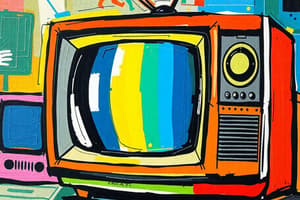Podcast
Questions and Answers
Which technological advancement was most pivotal in transitioning television from experimental broadcasting to widespread household adoption in the United States?
Which technological advancement was most pivotal in transitioning television from experimental broadcasting to widespread household adoption in the United States?
- The invention of the cathode ray tube as an image pickup device, enabling electronic image capture and display. (correct)
- The development of coaxial cable networks, which allowed for broader distribution of television signals to remote areas.
- The refinement of vacuum tube technology for signal amplification, reducing signal loss over long transmission distances.
- The standardization of broadcast frequencies by the FCC, ensuring compatibility among different manufacturers' television sets.
How did the 'Golden Age of Television' impact the sociopolitical landscape of America?
How did the 'Golden Age of Television' impact the sociopolitical landscape of America?
- It encouraged decentralization of media production, enabling the showcasing of niche cultural perspectives on national platforms.
- It triggered widespread public debates on censorship and media bias, resulting in strict regulatory reforms.
- It provided a unifying cultural experience that amplified social norms and subtly influenced public opinion through popular shows and political ads. (correct)
- It facilitated the rise of independent political commentators and news outlets, thus disrupting the established media.
What distinguishes television's impact on mass media compared to earlier forms of communication?
What distinguishes television's impact on mass media compared to earlier forms of communication?
- Television fostered more interactive communication, enabling real-time feedback from viewers to broadcasters.
- Television reduced the influence of advertising on consumer behavior, leading to more informed purchasing decisions.
- Television amplified the speed at which information could be disseminated, creating a more homogenized culture. (correct)
- Television created a more localized media landscape, allowing communities to produce content for local audiences.
In what specific way has television most profoundly changed the nature of political discourse in America?
In what specific way has television most profoundly changed the nature of political discourse in America?
How might the homogenization of culture through television lead to potential socio-political consequences in America?
How might the homogenization of culture through television lead to potential socio-political consequences in America?
Considering the historical role of television in American politics, which statement best encapsulates its enduring influence, acknowledging both its informative and manipulative potentials?
Considering the historical role of television in American politics, which statement best encapsulates its enduring influence, acknowledging both its informative and manipulative potentials?
How does television's capacity to rapidly and consistently reach large audiences most significantly affect the dynamics of political campaigns and public discourse?
How does television's capacity to rapidly and consistently reach large audiences most significantly affect the dynamics of political campaigns and public discourse?
In what way does the economic structure of television broadcasting, particularly the reliance on advertising revenue, MOST influence the content and nature of programming?
In what way does the economic structure of television broadcasting, particularly the reliance on advertising revenue, MOST influence the content and nature of programming?
Considering the portrayal of minorities on television, what is the most critical factor hindering progress toward fair and accurate representation, despite recent efforts to increase diversity?
Considering the portrayal of minorities on television, what is the most critical factor hindering progress toward fair and accurate representation, despite recent efforts to increase diversity?
What is the MOST significant, long-term effect of exposing children to violence on television, considering its potential impact on their psychological and social development?
What is the MOST significant, long-term effect of exposing children to violence on television, considering its potential impact on their psychological and social development?
Flashcards
Presidential Debates
Presidential Debates
Major televised event in American politics, watched by millions every four years.
TV as Propaganda
TV as Propaganda
Use of television to promote specific political agendas or sway public opinion, often during the Cold War.
TV Shaping Opinion
TV Shaping Opinion
Television's ability to shape how people perceive and understand political events and issues.
Minority Portrayal on TV
Minority Portrayal on TV
Signup and view all the flashcards
TV Violence Impact
TV Violence Impact
Signup and view all the flashcards
Philo T. Farnsworth
Philo T. Farnsworth
Signup and view all the flashcards
Golden Age of Television
Golden Age of Television
Signup and view all the flashcards
Mass Media
Mass Media
Signup and view all the flashcards
Educational TV Programs
Educational TV Programs
Signup and view all the flashcards
Presidential Debates (Televised)
Presidential Debates (Televised)
Signup and view all the flashcards
Study Notes
- Television's origins trace back to early 1900s experimental broadcasting.
Early Development
- Philo T. Farnsworth created the first electronic television system in 1928.
- His system used cathode ray tubes for image pickup.
- Television became widespread in American homes in the late 1940s.
Golden Age of Television
- The 1950s marked the Golden Age of Television.
- CBS, NBC, and ABC were the dominant networks.
- Popular shows included "I Love Lucy," "Leave It to Beaver," and "The Tonight Show".
- These shows influenced American culture and social norms.
- Television became important in political campaigns via TV ads.
Impact on American Society
- Television significantly shaped culture and politics.
- It influenced American thought, actions, and interactions.
- It impacted discussions around race relations, gender roles, and sexuality.
- Television's ability to create mass media is a notable effect.
- Mass media allows programs to reach large audiences.
- It has had influence over public opinion.
- Presidential debates are broadcast live, enabling millions to form candidate opinions.
- Television provides potential for education.
- Many educational programs offer info on history and science.
- These programs benefit children without traditional classroom access.
- Television has homogenized culture and provided a platform for diverse perspectives.
Influence on American Politics
- Presidential debates are integral to the political process.
- Viewers see candidates in action to make informed decisions.
- The first televised debate was in 1952 between Eisenhower and Stevenson.
- Over 60 million people watched the first debate
- Television became a tool for propaganda and manipulation.
- During the Cold War, it promoted anti-communist sentiments.
- Political campaigns use TV ads to sway public opinion.
- Television shapes public opinion through news, talk shows, and other media.
- Politicians must craft messages to resonate with the audience.
- It shapes public opinion on social issues, including race, gender, and LGBT rights.
Shaping Public Opinion
- Television influences perceptions and understanding of political events and issues.
- It reaches large audiences quickly and consistently.
- TV can be used for propaganda or persuasion during election campaigns.
- News programs set the agenda for public discourse and frame specific topics.
- Television shapes cultural norms and values.
- Sitcoms and reality TV expose viewers to different lifestyles and belief systems.
- The popularity of reality TV may contribute to liberal attitudes toward teenage independence.
Source of News and Information
- The first television broadcast occurred on July 13, 1928, by John Logie Baird in Scotland.
- Regular TV broadcasts started in the U.S. in 1947 with NBC's "Mary Kay and Johnny".
- Television provides breaking news, sports updates, weather, entertainment, and political coverage.
- Local news stations are relied upon to stay informed.
- Concerns exist regarding accuracy and sensationalism in TV news.
- Viewers may struggle to differentiate between fact and fiction in news.
Portrayal of Minorities
- Historically, minority groups have faced underrepresentation or stereotypical portrayals.
- Concerns exist that television perpetuates negative stereotypes and reinforces power structures.
- Efforts have been made to increase representation with shows like "Black-ish" and "Fresh Off the Boat."
- Progress is slow, and underrepresentation persists.
- There is a lack of diverse writers and producers.
- Without diverse voices, accurate representation is challenging.
Impact of Violence on Children
- Exposure to violent media can desensitize children.
- Effects can include increased aggression and decreased empathy.
- It is pronounced among young viewers developing morals.
- TV violence may reinforce gender stereotypes and anti-social behavior.
- It has been linked to increased fear and anxiety in children.
- Awareness of potential negative effects and limiting exposure is important.
Advertising Influence
- Advertisers pay for airtime, impacting program decisions.
- Networks tailor programming to appeal to advertisers rather than viewers.
- Show schedules are changed to accommodate commercials.
- Sitcoms are favored due to higher ratings and ad revenue.
- Advertisers pressure networks for product placements.
- Product placement occurs in the form of subtle mentions or overt scenes.
- This promotion is a major revenue source for TV networks.
Impact of Reality TV
- Reality TV influences popular culture.
- Phrases and concepts from reality TV have become part of everyday language.
- "Fake news" was coined on "The Apprentice".
- Reality TV stars achieve fame beyond their shows.
- Examples include Paris Hilton and Kim Kardashian.
- Reality TV influences political discourse.
- The confrontational format has been compared to modern politics.
- Critics argue that reality TV contributes to polarization and incivility.
The Future of Television
- Trends include increased streaming services, personalized experiences, and original programming.
- Streaming services like Netflix and Hulu allow on-demand viewing.
- This trend is expected to continue.
- Personalized viewing experiences use algorithms to recommend content.
- Systems may shift from linear programming to tailored viewing.
- There is an increasing focus on original programming.
- Networks create exclusive content to stand out.
- Expects to see high-quality dramas, comedies, and reality shows.
Studying That Suits You
Use AI to generate personalized quizzes and flashcards to suit your learning preferences.




